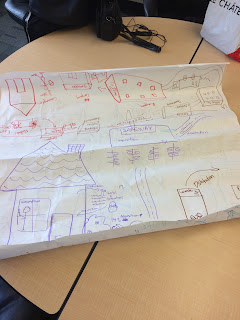The Orchard Garden CFE has been an enjoyable experience the first few days. During the practicum we were all going 100 mph so it has been nice to take a little step back. After our introduction yesterday, I had high hopes for CFE today. Everyone has been so nice and pleasant to work with. The atmosphere is awesome and I like that everyone does their part to contribute. Today we covered food sovereignty for the first part of the day and then ended off by going for a walk to wreck beach with a big group.
Our first activity for food sovereignty had us working in teams to draw a diagram of 4 components. These 4 components were acquisition, production, distribution and consumption. We had to base our diagram on how these 4 components are used to bring food in and out of the house. Acquisition happens when we purchase food from stores, when stores purchase from supplier or other people purchase from us. Production occurs when food is produced on farms, in our gardens, greenhouses, etc. Distribution happens when the food is moved to and from stores, to and from our house, to and from farms, etc. Consumption is usually the last step as the food will end up in someones belly.
The last activity we worked on focused on products from different countries and how they get to Canada. Again, we made diagrams in the same groups and although we had different products, the process for all were very similar.
We ended off with a discussion after learning about how the world has changed in good and bad ways with food consumption. There are many good things coming from the abundance of food we have now as compared to the past. Things are so easy to get and there is an increasing amount of knowledge of the foods we consume. However, it isn't all sunshine and rainbows as farmers lives are more difficult, foods are losing their nutrition and there is a lack of diversity with food types. After a little break, we were on our way for our little trek to Wreck Beach.
Brendan Ha — Trekkin' to Wreck Beach:

Also, here's a picture of Julian trying to look cool:

Brendan Ha — Trekkin' to Wreck Beach:
 |
| The beautiful people. |
 |
| Hart explaining the various political boundaries of the land. |

Ah, the breath of the wild! After being cooped up like chickens for much of our practicum, Hart Banack and Marina Milner-Bolotin from Wild about Vancouver led us to the great outdoors. Graduate students, faculty, teacher candidates, and a pair who came by Twitter-tweet joined together to explore the infamous and breathtaking landscape of the clothing-optional Wreck Beach.
Once we embarked on our Wreck Trek, Hart and Marina explored the landmarks spotted throughout the campus. In particular, we were reminded of the incredible variety of trees here. This was something I personally have never given thought to during my class to class journeys. Really, all my thoughts were consumed by the urgent need to get to my next class on time while avoiding the onslaught of backpacks and longboards around me.
We finally arrived at our destination and braved the steep stairs that led us to the beach. Already, I felt as if we were becoming more attuned to the animated world around us, and subsequently, we became more attuned to each other.
 |
| Joyce being subjected to Sasha's will |
Walking through the wilderness afforded us with the fresh air of companionship. Our observations were expressed in curious remarks of the briny husk of a crab's carcass, of the foggy, yet grand parade of mountains in the horizon, and of the unyielding boulders that grumbled underneath our feet. We had the freedom to discuss whatever we wanted! Yet, our group continually referenced the beach's landscapes, lived in the moment—and posed like the unsinkable 20-year old platonic pair, Winslet and DiCaprio, on various natural set pieces.
Also, here's a picture of Julian trying to look cool:
 |

Although the links to practical pedagogy may not be conspicuous to the common observer, I believe the experience was invaluable for us to contextualize why learning should occasionally venture into the outdoors. Like magnolias trumpeting with colour throughout the Orchard Garden, opportunities for learning were embedded vibrantly within the environment. For example, a moment of awe besieged us when we saw the stratification of sediment on a cliff-side. How easily can you translate such a view to a biological and geological lesson? Marina, in particular, was continually enraptured by the natural beauty that surrounded us.
Once we conquered the Wreck Beach stairs yet again, everyone was uplifted and rejuvenated by the communal experience. I believe we've all been emboldened to bring our classes outside and to recognize the resources around us... Resources of the natural kind and of the pedagogical kind.








No comments:
Post a Comment